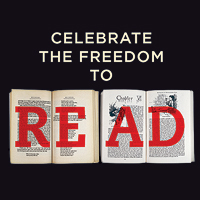ALA Banned Book List

Every year, the ALA helps to celebrate and recognize famous books that have been banned or challenged in the past with their Banned Books Week. In 2015, the week was September 27-October 3. While highlighting the past year’s most frequently challenged books, the ALA also hopes to foster a discussion about Intellectual Freedom.
Here is the list of books that were challenged or banned in 2014:
The Absolutely True Diary of a Part-Time Indian by Sherman Alexie — Reasons: anti-family, cultural insensitivity, drugs/alcohol/smoking, gambling, offensive language, sex education, sexually explicit, unsuited for age group, violence. Additional reasons: “depictions of bullying”
Persepolis by Marjane Satrapi — Reasons: gambling, offensive language, political viewpoint. Additional reasons: “politically, racially, and socially offensive,” “graphic depictions”
And Tango Makes Three by Justin Richardson and Peter Parnell –Reasons: Anti-family, homosexuality, political viewpoint, religious viewpoint, unsuited for age group. Additional reasons: “promotes the homosexual agenda”
The Bluest Eye by Toni Morrison — Reasons: Sexually explicit, unsuited for age group. Additional reasons: “contains controversial issues”
It’s Perfectly Normal by Robie Harris — Reasons: Nudity, sex education, sexually explicit, unsuited to age group. Additional reasons: “alleges it child pornography”
Saga by Brian Vaughan and Fiona Staples — Reasons: Anti-Family, nudity, offensive language, sexually explicit, and unsuited for age group.
The Kite Runner by Khaled Hosseini — Reasons: Offensive language, unsuited to age group, violence
The Perks of Being a Wallflower by Stephen Chbosky — Reasons: drugs/alcohol/smoking, homosexuality, offensive language, sexually explicit, unsuited for age group. Additional reasons: “date rape and masturbation”
A Stolen Life by Jaycee Dugard — Reasons: drugs/alcohol/smoking, offensive language, sexually explicit, and unsuited for age group
Drama by Raina Telgemeier — Reasons: sexually explicit
In the first decade of this century (2000-2009) there were over 5000 challenges reported to the Office of Intellectual Freedom due to a variety of topics such as:
- 1,577 challenges due to “sexually explicit” material;
- 1,291 challenges due to “offensive language”;
- 989 challenges due to materials deemed “unsuited to age group”;
- 619 challenged due to “violence”‘ and
- 361 challenges due to “homosexuality.”
- 274 challenges due to “occult” or Satanic” themes
- 291 challenges due to their “religious viewpoint”
These lists provided by The Office for Intellectual Freedom of the American Library Association highlight books and themes that people deem inappropriate for public and/or school libraries to carry and offer to its patrons.
More recently, a woman in Knoxville Tennessee objected to her son getting assigned to read a book that she considered to be pornographic. The book is The Immortal Life of Henrietta Lacks by Rebecca Skloot. The story is about a woman with cervical cancer whose cells were used to develop many advancements in medicine, including the polio vaccine. This case essentially ended with the student being assigned another book to read, but the book still being available in his library for other patrons. While on the one hand, I applaud this woman for being involved in her son’s education and academic progress. It’s great that she wants to help her child in his learning process. However, there is a difference between making a choice for your family and making a choice for everyone in your community.
Lastly, it must be pointed out that book banning is basically an exercise in futility in this day and age. Information is available in so many forms and in so many places, that if people want to read The Perks of Being a Wallflower they can find it at the library, bookstore, Kindle, or on the internet, or they can watch the movie based on the book. To be honest, I firmly believe that people who challenge the existence of certain books in their library are actually owed a debt of gratitude by the author because they usually end up making the book more popular than if they hadn’t said anything. That being said, the ALA and libraries en masse believe in the idea of Intellectual freedom which can be defined as the right of every individual to seek and receive information without any restrictions.
Sources
http://rebeccaskloot.com/the-immortal-life/












